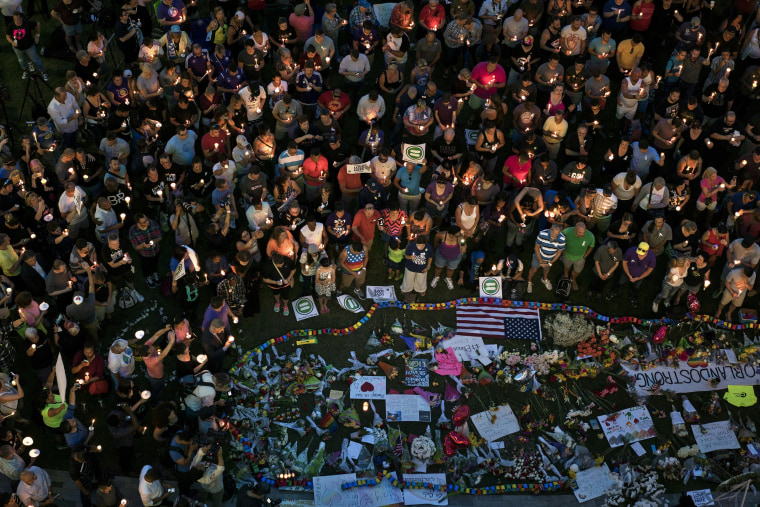Before heading to West Hollywood to march in the LA Pride Parade on Sunday, Polly Kim briefly told her 19-year-old daughter about the shooting that had occurred at an Orlando gay bar earlier that morning. It wasn’t until the two arrived at the parade and saw the increased security that they began to learn the full extent of the tragedy.
“There were candles and flowers and posters mentioning [the number of] victims, so we realized it was much more than we had originally heard,” Kim said.
As Americans across the country continue to try to make sense of the mass shooting, which left 50 people dead, many parents and community leaders are grappling with how to best discuss the tragic events with LGBTQ youth and young adults.
Kim is a board member of the Los Angeles chapter of PFLAG, the nation’s largest organization for families and allies of those identifying as gay, lesbian, bisexual, transgender and queer. She joined the organization four years ago when her daughter came out as gay, wanting to meet parents of other children who identify as LGBTQ. Since then, she has become an active member in the PFLAG community and a strong promoter of the organization’s mission of providing support, education and advocacy for those identifying as LGBTQ.
“In the aftermath of a disaster, a person may be struggling to understand how and why a disaster occurred ... Families and community leaders can help support LGBTQ youth by allowing space to talk about it and ask for support.”
Following the events in Orlando, Kim has attended vigils with her daughter and the two have talked openly about the attack. “Parents need to let their children know that they can talk to them about anything, and that they are there for them and love and support them,” Kim said.
Kim’s involvement with PFLAG has helped provide her with the tools necessary to have this type of open conversation with her daughter, though many other parents may still struggle in trying to determine the best way to discuss the tragic events in Orlando with their LGBTQ children.
Shannon Cuttle, founder of the Safe Schools Action Network, which is committed to empowering youth, educators, and communities in building inclusive safer schools, said it is important for parents to be an ally and supportive of LGBTQ youth.
“In the aftermath of a disaster, a person may be struggling to understand how and why a disaster occurred,” Cuttle said. “Families and community leaders can help support LGBTQ youth by allowing space to talk about it and ask for support.”
Kirk Shepard, a licensed professional counselor in Portland, Ore., advised that it is also important that parents and community leaders be prepared to answer questions that youth may have about the attack. “With that in mind, this is a devastating and complex loss, so it is also completely okay to say that you don’t have all the answers,” Shepard added.
Shepard, who dedicates a large portion of his private practice to LGBTQ communities, also stressed the importance of allowing LGBTQ youth to feel validated about their fears and concerns.
“I encourage parents to not assume that [they] know what LGBTQ youth are experiencing,” Shepard said. “Encourage them to talk and express themselves, but don’t pressure LGBTQ youth to process the attack if they seem resistant to talking.”
Read More: Orlando Victims Remembered for Courage, Passion, Pride
Jennifer Creson, a licensed mental health counselor in Seattle, said it was also important to stress the rarity of these events, and the fact that even though mass shootings and terrorist attacks might feel like they are happening on a regular basis, in reality, they are still a very rare occurrence.
Creson, whose client base is also primarily made up of LGBTQ youth and adults, said young and older youth could benefit from engaging in activities that make them feel empowered.
“For younger kids, this might look like making cards or artwork to send to victims’ families,” Creson said. “Older youth might write to legislators or school administration about issues that affect their safety.”
She suggested emphasizing that “although scary things can and do happen in the world, we find support and power in community. Going to Pride celebrations…provide a contradiction to those scary things. Show [youth] as an adult that you are not afraid to be in community and that terror attacks won’t keep you isolated.”
Back in Los Angeles, it’s this sense of being with others that has been a source of strength for Kim.
“I ended up making dear friends and becoming part of a community,” Kim said of her experience with PFLAG for the past four years. “It can be comforting and helpful to talk to other parents with similar concerns.”
